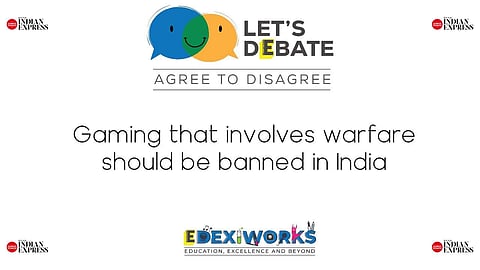
- News
- Campus
- Exam
- Podcast
- Web Stories
- Do You Know
- Path Finders - UG Programs
- Videos
- Élitscape

PUBG has been banned by the Indian Government ever since September 2, 2020. But what about other warfare games, would you want them banned or no? That's what these children from various schools across India debate on at The New Indian Express' Let's Debate. While some want them banned because of severe gaming addiction others argue that it makes you smarter.
The students were debating whether Gaming that involves warfare should be banned in India at The New Indian Express' virtual inter-school debate competition, Let's Debate that streamed live on April 13, 2021. The largest inter-school virtual debate competition was held in association with Hindustan Institute of Technology and Science, MEIL and Linc Pens. The judges for the debate were Edison Thomas, Editor, Indulge, TNIE and Sai Prasad Vishwanathan, who despite being wheelchair-bound has gone skydiving, been to Antarctica, and has been conducting counseling sessions for over 35,000 students.
Annie Josephine Fenol, a Class VII student from Bhavan's Vidya Mandir, Kerala, speaking against the topic said, "Gun violence was here long before the gaming world began to exist and so did behavioural problems. There's no point in calling for a ban. It has been an ugly stereotype that games cause children to become violent, lack attention span, and generally exhibit anti-social tendencies, it's actually quite the opposite. Anti-social children turn to such entertainment mediums as it's the only part of their lives they have any sense of control over. These games in general actually increase aptitude in the human brain and make you smarter, possibly teaching you real-life skills."
Shreeja Mallick, from Shiv Nadar School, Uttar Pradesh, speaking for the topic argued, "Games involving warfare usually contain excessive violence, in form of physical acts or weapons. These games can gravely impact numerous brains and actions. Due to the attractive graphics and adventurous activities, these games lure the children into them leading to addiction and an increase in screen time. This compulsiveness towards the game affects a person's daily routine, a child's academics, and decreases physical activity. A child could have weak eyesight due to the increase in screen time. Restricting themselves to these games, they are isolating themselves from their surroundings."
The judges were quite impressed with the children and congratulated each one of them. In the end, Sai Prasad Vishwanathan added, "It was really enlightening to actually hear people's perspectives. In a debate, always listen to the other's perspective, a debate is about taking away someone else's argument. No matter what always think of it as a learning process." While Edison Thomas added, "I think the kids were fantastic. I would have spoken for the topic, but it was interesting to see how some spoke against the topic and they gave me a new perspective. The effort that the kids have put into this whole thing is impressive."
The awards were given to the following students:
Finest point: Shreeja Mallick, Shiv Nadar School
Counter Strike: Sanchita Suri, Mother's International School, Bengaluru
Lighter side: Annie Josephine Fenol, Bhavan's Vidya Mandir, Kerala
Once our online voting ends, the results of every junior round of TNIE's Let's Debate will be announced at 6 pm on Sunday, April 18 at www.edexlive.com/debate. Stay tuned!
